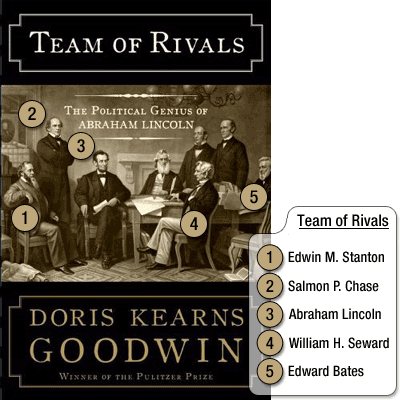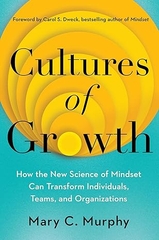-
-
-
Tổng tiền thanh toán:
-
-
Thông tin
-
Tìm sách theo yêu cầu
Team of Rivals: The Political Genius of Abraham Lincoln Paperback
by Doris Kearns Goodwin (Author)
Winner of the Lincoln Prize
This brilliant multiple biography is centered on Lincoln's mastery of men and how it shaped the most significant presidency in the nation's history.
- Link: http://www.amazon.com/Team-Rivals-Political-Abraham-Lincoln/dp/0743270754
Winner of the Lincoln Prize
This brilliant multiple biography is centered on Lincoln's mastery of men and how it shaped the most significant presidency in the nation's history.
Product Details
Paperback: 944 pages
- Publisher: Simon & Schuster (September 26, 2006)
- Language: English
- ISBN-10: 0739469762
- ISBN-13: 978-0739469767
- ASIN: 0743270754
- Product Dimensions: 9.2 x 6.1 x 1.8 inches
- Shipping Weight: 3 pounds (View shipping rates and policies)
- Average Customer Review: 4.7 out of 5 stars See all reviews (2,086 customer reviews)
- Amazon Best Sellers Rank: #1,432 in Books (See Top 100 in Books)
- #2 in Books > Biographies & Memoirs > People, A-Z > ( L ) > Lincoln, Abraham
- #3 in Books > Biographies & Memoirs > Historical > United States > Civil War > Military Leaders
- #4 in Books > Politics & Social Sciences > Politics & Government > Elections & Political Process > Leadership
Editorial Reviews
Amazon.com Review
The life and times of Abraham Lincoln have been analyzed and dissected in countless books. Do we need another Lincoln biography? In Team of Rivals, esteemed historian Doris Kearns Goodwin proves that we do. Though she can't help but cover some familiar territory, her perspective is focused enough to offer fresh insights into Lincoln's leadership style and his deep understanding of human behavior and motivation. Goodwin makes the case for Lincoln's political genius by examining his relationships with three men he selected for his cabinet, all of whom were opponents for the Republican nomination in 1860: William H. Seward, Salmon P. Chase, and Edward Bates. These men, all accomplished, nationally known, and presidential, originally disdained Lincoln for his backwoods upbringing and lack of experience, and were shocked and humiliated at losing to this relatively obscure Illinois lawyer. Yet Lincoln not only convinced them to join his administration--Seward as secretary of state, Chase as secretary of the treasury, and Bates as attorney general--he ultimately gained their admiration and respect as well. How he soothed egos, turned rivals into allies, and dealt with many challenges to his leadership, all for the sake of the greater good, is largely what Goodwin's fine book is about. Had he not possessed the wisdom and confidence to select and work with the best people, she argues, he could not have led the nation through one of its darkest periods.

1. Edwin M. Stanton
Stanton treated Lincoln with utter contempt at their initial acquaintance when the two men were involved in a celebrated law case in the summer of 1855. Unimaginable as it might seem after Stanton's demeaning behavior, Lincoln offered him "the most powerful civilian post within his gift"--the post of secretary of war--at their next encounter six years later. On his first day in office as Simon Cameron's replacement, the energetic, hardworking Stanton instituted "an entirely new regime" in the War Department. After nearly a year of disappointment with Cameron, Lincoln had found in Stanton the leader the War Department desperately needed. Lincoln's choice of Stanton revealed his singular ability to transcend personal vendetta, humiliation, or bitterness. As for Stanton, despite his initial contempt for the man he once described as a "long armed Ape," he not only accepted the offer but came to respect and love Lincoln more than any person outside of his immediate family. He was beside himself with grief for weeks after the president's death.
Wait Till Next Year: A Memoir
No Ordinary Time: Franklin and Eleanor Roosevelt: The Home Front in World War II
Lyndon Johnson and the American Dream
Lincoln's Melancholy: How Depression Challenged a President and Fueled His Greatness by Joshua Wolf Shenk
Grant and Sherman: The Friendship That Won the Civil War by Charles Bracelen Flood
The March: A Novel by E.L. Doctorow
Ten years in the making, this engaging work reveals why "Lincoln's road to success was longer, more tortuous, and far less likely" than the other men, and why, when opportunity beckoned, Lincoln was "the best prepared to answer the call." This multiple biography further provides valuable background and insights into the contributions and talents of Seward, Chase, and Bates. Lincoln may have been "the indispensable ingredient of the Civil War," but these three men were invaluable to Lincoln and they played key roles in keeping the nation intact. --Shawn Carkonen
The Team of Rivals
Team of Rivals doesn't just tell the story of Abraham Lincoln. It is a multiple biography of the entire team of personal and political competitors that he put together to lead the country through its greatest crisis. Here, Doris Kearns Goodwin profiles five of the key players in her book, four of whom contended for the 1860 Republican presidential nomination and all of whom later worked together in Lincoln's cabinet.
1. Edwin M. Stanton
Stanton treated Lincoln with utter contempt at their initial acquaintance when the two men were involved in a celebrated law case in the summer of 1855. Unimaginable as it might seem after Stanton's demeaning behavior, Lincoln offered him "the most powerful civilian post within his gift"--the post of secretary of war--at their next encounter six years later. On his first day in office as Simon Cameron's replacement, the energetic, hardworking Stanton instituted "an entirely new regime" in the War Department. After nearly a year of disappointment with Cameron, Lincoln had found in Stanton the leader the War Department desperately needed. Lincoln's choice of Stanton revealed his singular ability to transcend personal vendetta, humiliation, or bitterness. As for Stanton, despite his initial contempt for the man he once described as a "long armed Ape," he not only accepted the offer but came to respect and love Lincoln more than any person outside of his immediate family. He was beside himself with grief for weeks after the president's death.
2. Salmon P. Chase
Chase, an Ohioan, had been both senator and governor, had played a central role in the formation of the national Republican Party, and had shown an unflagging commitment to the cause of the black man. No individual felt he deserved the presidency as a natural result of his past contributions more than Chase himself, but he refused to engage in the practical methods by which nominations are won. He had virtually no campaign and he failed to conciliate his many enemies in Ohio itself. As a result, he alone among the candidates came to the convention without the united support of his own state. Chase never ceased to underestimate Lincoln, nor to resent the fact that he had lost the presidency to a man he considered his inferior. His frustration with his position as secretary of the treasury was alleviated only by his his dogged hope that he, rather than Lincoln, would be the Republican nominee in 1864, and he steadfastly worked to that end. The president put up with Chase's machinations and haughty yet fundamentally insecure nature because he recognized his superlative accomplishments at treasury. Eventually, however, Chase threatened to split the Republican Party by continuing to fill key positions with partisans who supported his presidential hopes. When Lincoln stepped in, Chase tendered his resignation as he had three times before, but this time Lincoln stunned Chase by calling his bluff and accepting the offer.
3. Abraham Lincoln
When Lincoln won the Republican presidential nomination in 1860 he seemed to have come from nowhere--a backwoods lawyer who had served one undistinguished term in the House of Representatives and lost two consecutive contests for the U.S. Senate. Contemporaries attributed his surprising nomination to chance, to his moderate position on slavery, and to the fact that he hailed from the battleground state of Illinois. But Lincoln's triumph, particularly when viewed against the efforts of his rivals, owed much to a remarkable, unsuspected political acuity and an emotional strength forged in the crucible of hardship and defeat. That Lincoln, after winning the presidency, made the unprecedented decision to incorporate his eminent rivals into his political family, the cabinet, was evidence of an uncanny self-confidence and an indication of what would prove to others a most unexpected greatness.
4. William H. Seward
A celebrated senator from New York for more than a decade and governor of his state for two terms before going to Washington, Seward was certain he was going to receive his party's nomination for president in 1860. The weekend before the convention in Chicago opened he had already composed a first draft of the valedictory speech he expected to make to the Senate, assuming that he would resign his position as soon as the decision in Chicago was made. His mortification at not having received the nomination never fully abated, and when he was offered his cabinet post as secretary of state he intended to have a major role in choosing the remaining cabinet members, conferring upon himself a position in the new government more commanding than that of Lincoln himself. He quickly realized the futility of his plan to relegate the president to a figurehead role. Though the feisty New Yorker would continue to debate numerous issues with Lincoln in the years ahead, exactly as Lincoln had hoped and needed him to do, Seward would become his closest friend, advisor, and ally in the administration. More than any other cabinet member Seward appreciated Lincoln's peerless skill in balancing factions both within his administration and in the country at large.
5. Edward Bates
A widely respected elder statesman, a delegate to the convention that framed the Missouri Constitution, and a former Missouri congressman whose opinions on national matters were still widely sought, Bates's ambitions for political success were gradually displaced by love for his wife and large family, and he withdrew from public life in the late 1840s. For the next 20 years he was asked repeatedly to run or once again accept high government posts but he consistently declined. However in early 1860, with letters and newspaper editorials advocating his candidacy crowding in upon him, he decided to try for the highest office in the land. After losing to Lincoln he vowed, in his diary, to decline a cabinet position if one were to be offered, but with the country "in trouble and danger" he felt it was his duty to accept when Lincoln asked him to be attorney general. Though Bates initially viewed Lincoln as a well-meaning but incompetent administrator, he eventually concluded that the president was an unmatched leader, "very near being a 'perfect man.'"
The Essential Doris Kearns Goodwin

Wait Till Next Year: A Memoir

No Ordinary Time: Franklin and Eleanor Roosevelt: The Home Front in World War II

Lyndon Johnson and the American Dream
More New Reading on the Civil War

Lincoln's Melancholy: How Depression Challenged a President and Fueled His Greatness by Joshua Wolf Shenk

Grant and Sherman: The Friendship That Won the Civil War by Charles Bracelen Flood

The March: A Novel by E.L. Doctorow
--This text refers to the Hardcover edition.
From Publishers Weekly
While Goodwin's introduction is a helpful summary and explanation for why another book about Lincoln, her reading abilities are limited: Her tone is flat and dry, and her articulation is overly precise. But the introduction isn't long and we soon arrive at Richard Thomas's lovely and lively reading of an excellent book. The abridgment (from 944 pages) makes it easy to follow the narrative and the underlying theme. Pauses are often used to imply ellipses, and one is never lost. But the audio version might have been longer, for there is often a wish to know a little more about some event or personality or relationship. Goodwin's writing is always sharp and clear, and she uses quotes to great effect. The book's originality lies in the focus on relationships among the men Lincoln chose for his cabinet and highest offices: three were his rivals for the Republican presidential nomination in 1860, and each considered himself the only worthy candidate. One is left with a concrete picture of Lincoln's political genius—derived from a character without malice or jealousy—which shaped the history of our nation. One is also left with the painful sense of how our history might have differed had Lincoln lived to guide the Reconstruction.
Copyright © Reed Business Information, a division of Reed Elsevier Inc. All rights reserved. --This text refers to the Audio CD edition.
Copyright © Reed Business Information, a division of Reed Elsevier Inc. All rights reserved. --This text refers to the Audio CD edition.
XEM CHI TIẾT TẠI AMAZON.COM
- Thông tin chi tiết
- Mục lục
- Đánh giá & bình luận của người mua
- Những cuốn sách cùng chủ đề hoặc có liên quan
Tại web chỉ có một phần nhỏ các đầu sách đang có nên nếu cần tìm sách gì các bạn có thể liên hệ trực tiếp với Thư viện qua Mail, Zalo, Fanpage nhé
Đăng ký nhận tin qua email
Hãy đăng ký ngay hôm nay để nhận được những tin tức cập nhật mới nhất về sản phẩm và các chương trình giảm giá, khuyến mại của chúng tôi.












